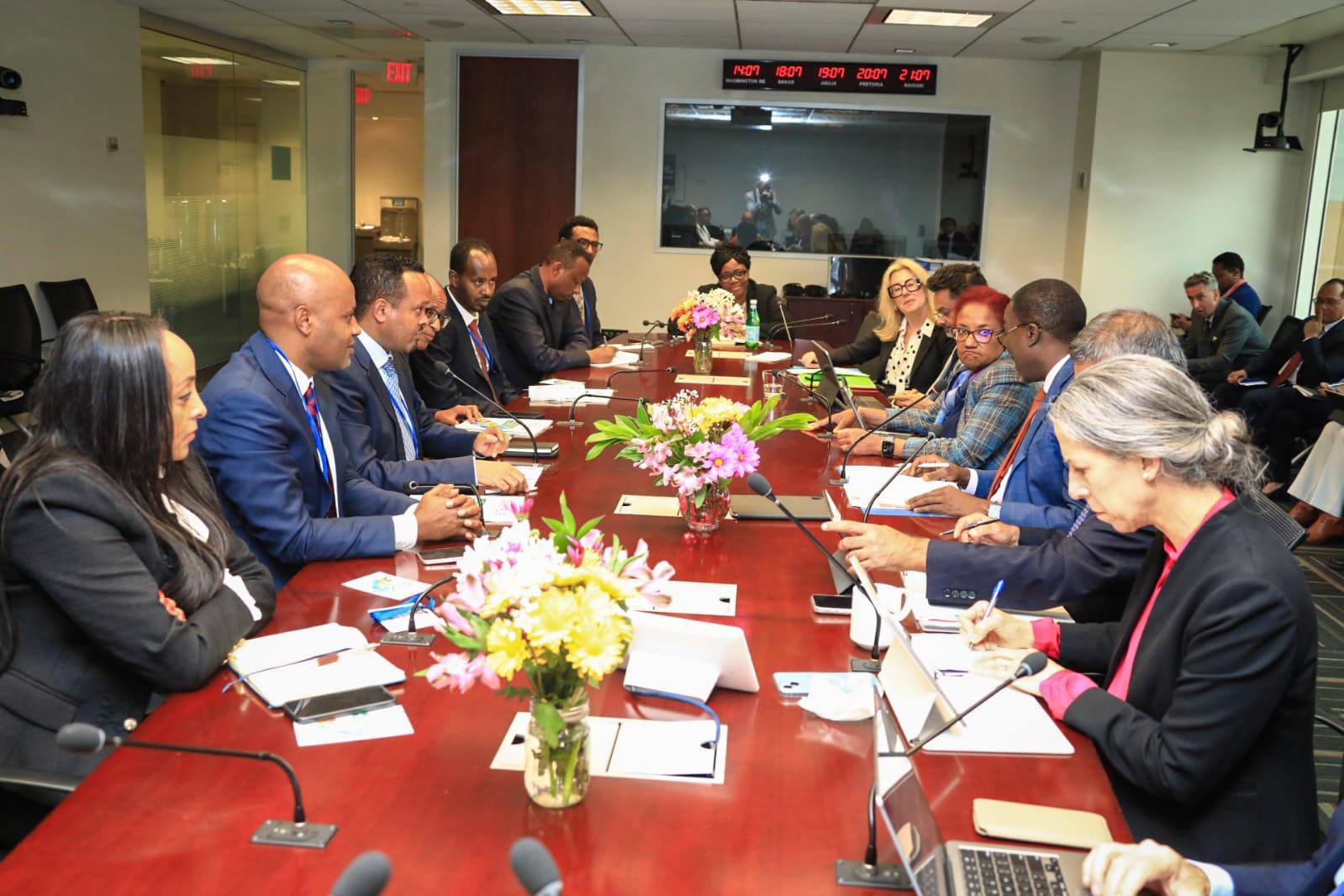Ethiopia High-level Delegation Hold Productive Discussions with WB, IMF and Kuwait Fund - ENA English
Ethiopia High-level Delegation Hold Productive Discussions with WB, IMF and Kuwait Fund

Addis Ababa, October 14, 2025 (ENA) -- A high-level Ethiopian delegation, Minister of Finance, led by Ahmed Shide, held productive discussions with Ndiame Diop, World Bank Vice President for Eastern and Southern Africa, during the 2025 World Bank-IMF Annual Meetings.
Members of the delegation included Eyob Tekalign, Governor of the National Bank of Ethiopia, Teklewold Atnafu, Senior Advisor to the Prime Minister and other senior officials.
The two sides exchanged views on Ethiopia’s ongoing macroeconomic reforms, the progress of current projects, and key priority areas for future collaboration.
Minister Ahmed expressed his appreciation for the World Bank’s substantial technical and financial support, acknowledging its pivotal role in advancing Ethiopia’s ambitious development agenda.
He provided an update on the implementation of pro-poor reforms and emphasized the importance of continued World Bank support to sustain reform momentum.
He also highlighted the need for scaled-up assistance in areas such as agricultural productivity, energy, human capital development, regional integration, and infrastructure.
Diop commended the Ethiopian government for its high-level leadership and whole-of-government approach, which has led to the success of the comprehensive reform program, including the achievement of critical macroeconomic targets within just one year of its launch.
The vice president reaffirmed the World Bank’s commitment to supporting Ethiopia’s development through its global flagship initiatives, including: Mission Energy 300, aimed at expanding access to energy; Mission Agriconnect, designed to enhance smallholder farmers’ productivity, access to finance, and value chain development.
Meanwhile, the high-level Ethiopian delegation held productive meetings with the IMF’s Deputy Managing Director, Nigel Clarke, and senior leadership of the IMF’s Africa Department to discuss the ongoing IMF-supported program aligned with Ethiopia’s Homegrown Macroeconomic Reform Agenda.
Ahmed extended appreciation for the IMF’s essential support in advancing Ethiopia’s reform agenda, which aims to unlock the country’s full economic potential, create jobs, and improve living standards for all Ethiopians, according to the Ministry of Finance.
He also emphasized the high financial cost of the reforms and called for increased concessional financing for Ethiopia, which is commensurate with the size and needs of one of Africa’s largest economies.
Governor Eyob briefed the IMF on the positive progress in Ethiopia’s debt restructuring negotiations under the G20 Common Framework—an essential pillar of the country’s broader reform program.
The Deputy Managing Director highlighted that Ethiopia’s bold reform agenda serves as a model for other countries and reaffirmed the IMF’s commitment to supporting Ethiopia’s transformation.
He also acknowledged the high cost of reform implementation and emphasized the importance of continued collaboration with development partners such as the World Bank to mobilize additional financing.
Clarke is planning to visit Ethiopia in December, where he will be meeting government institutions, policymakers, and the private sector to discuss Ethiopia’s Program.
The meeting concluded with both parties agreeing to work closely during the upcoming Third Review of the IMF program, planned to take place in Addis Ababa. The review will assess reform progress and identify critical areas for deeper collaboration to support Ethiopia’s long-term development and sustained economic growth.
On the sidelines of the 2025 World Bank and IMF Annual Meetings, the Finance Minister Ahmed Shide also held a productive meeting with Waleed Al-Bahar, Acting Director General of the Kuwait Fund for Arab Economic Development.
The meeting focused on strengthening the longstanding partnership between Ethiopia and the Kuwait Fund.
Discussions covered Ethiopia’s recent economic reforms, ongoing projects financed by the Fund, national development priorities, and opportunities to enhance the Fund’s engagement in Ethiopia.
Ahmed Shide also provided an overview of the Government’s macroeconomic reform efforts—including the debt restructuring process—and outlined Ethiopia’s key development priorities, with a particular emphasis on private sector development and transport infrastructure, where the Fund’s support remains critical.
A key topic of discussion was financing for the development of Ethiopia’s new international mega airport.
Al-Bahar commended Ethiopia’s economic vision and the early achievements of its reform agenda.
He reaffirmed the Kuwait Fund’s commitment to supporting Ethiopia’s development, particularly in financing large-scale infrastructure projects and other priority sectors.
He also encouraged closer collaboration with the Arab Coordination Group to strengthen resource mobilization and improve coordination among Arab financial institutions.